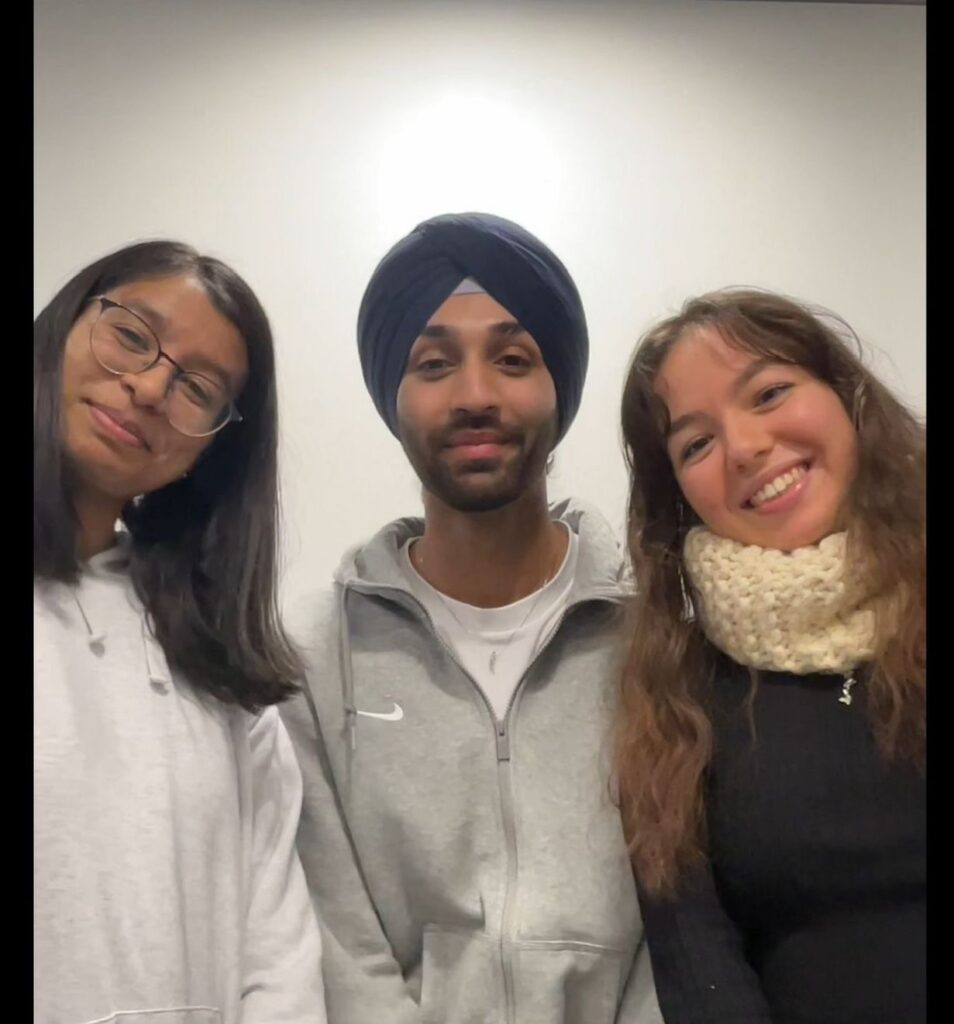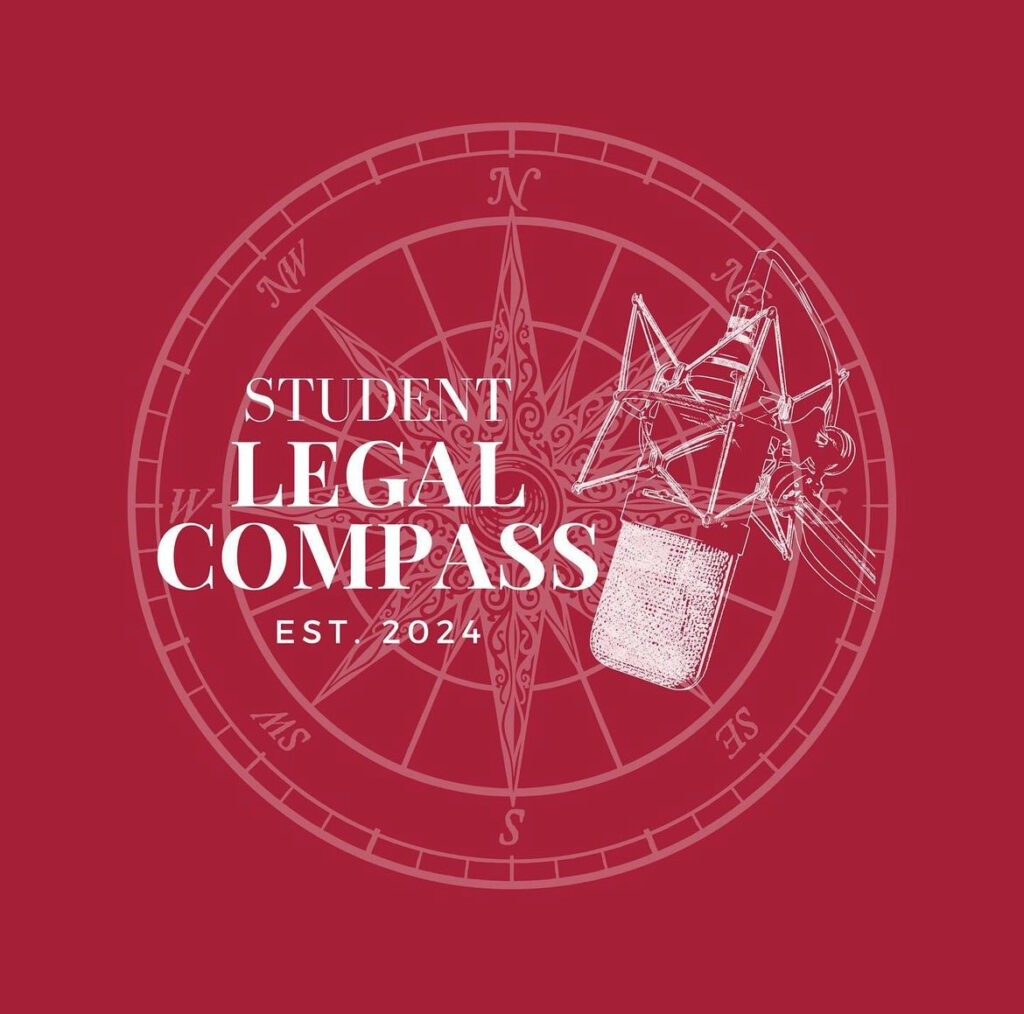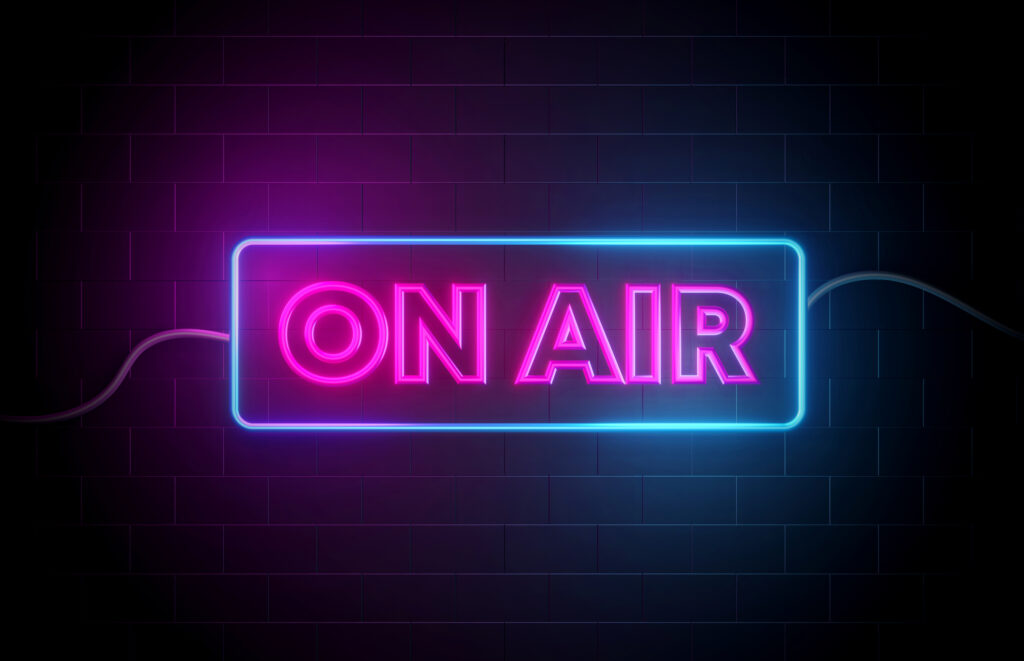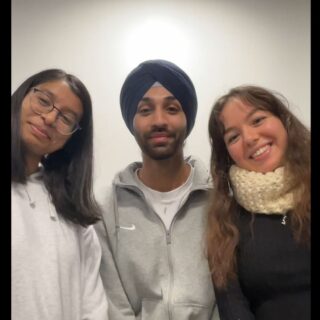LLB2 students Gurnoor Mand, Poomiha Neduncheliyan and Rozerin Harman have launched their own podcast: The Student Legal Compass (available on all the usual hosting platforms). Lawbore sent over some questions for them on where the concept came from, their work processes and what they listen to themselves… (they have answered each question as a team). First of all though, let’s hear the origin story:

Poomiha and Rozerin first met in August through their roles as Legal Cheek Campus Ambassadors. During their discussions about innovative ideas for Legal Cheek, Poomiha proposed starting a podcast that would be independent of Legal Cheek. Coincidentally, Rozerin had prior experience as a podcast coordinator with PIEL UK (Practice Interest in Environmental Law), which made the idea even more exciting. Both of them had always dreamed of launching their own podcast, but it was not until they crossed paths that this vision started to become a reality.
A ‘Meet and Greet’ event hosted by one of the City Law societies brought them together with Gurnoor. They felt his skills, experience and energy were exactly what they needed to bring this podcast to life. The first formal meeting as a three marked the point where things began to take shape and become official.
The Student Legal Compass has quite an ambitious content plan; are priorities driven by things that you have found challenging as law students, or do you get ideas from others?
The purpose of this podcast is to provide individuals—students from all disciplines, not just law—with answers to their pressing questions. When we were in our first year of law school, we had countless questions and had to figure things out the hard way. Through this podcast, we aim to make the process easier for both law and non-law students by addressing key questions and sharing insights that are essential for pursuing a legal career.
We also plan to feature guest speakers chosen specifically from our audience to address their unique questions. We are open to suggestions from our listeners and encourage them to actively contribute to the topics we discuss. As second-year students, we bring our own ideas to the table; exploring what graduates are currently doing, what societies are planning, and debunking common misconceptions about societies. These are just a few of the many topics we plan to cover.
What’s the process for putting it together? (The technical stuff)

We had the opportunity to speak with Jake Schogger from the Commercial Law Academy, who suggested using Riverside—a platform designed for editing podcasts and video recordings. He explained that the platform captures high-quality audio even without professional microphones and makes the editing process much simpler.
Our process begins with recording the episode on Riverside. Once the recording is complete, we take turns editing the video to refine the content. Afterward, Rozerin adds the final touches by reviewing the recording, ensuring everything is in order, and adding the intro and outro music.
While Rozerin works on the final edits, Gurnoor focuses on creating promotional posts to announce the new episode and engage with our followers on social media.
To ensure our guest speakers are satisfied, we send them the recording for review and approval before releasing the episode to our audience. This step guarantees that everyone involved is happy with the final product.
How do you split the planning/creation between the three of you?
We divide the planning and creation process among ourselves, with each of us focusing on specific areas. Gurnoor usually handles social media platforms and digital engagement, ensuring our online presence is strong. Poomiha takes charge of reaching out to guest speakers, while Rozerin focuses on editing the episodes, troubleshooting any issues, and setting preparation goals and plans.
That said, we don’t have rigidly designated roles. We all step in to help each other whenever one of us is unavailable or needs support. For instance, Poomiha is learning how to edit episodes, assisting with post designs, and contributing to question preparations. Similarly, Gurnoor is picking up editing skills and other tasks as we work collaboratively.
By teaching each other the skills we know, we ensure everyone gets the opportunity to practice and develop technical abilities that could be valuable in the future.
How often will a new episode be released?
As we’ve just started the podcast, we’re still navigating certain challenges, such as securing sponsorships to fund the podcast and drafting agreements for guest speakers to sign. Despite these hurdles, our goal is to release two episodes per month.
That said, we’re quick to adapt and find solutions to any issues that arise, ensuring the smooth and consistent release of episodes over time.
Why do you think listening to people talking has become such a popular medium in this era of the visual?

We think this rise in podcasts stems from the post-COVID era, when many people, especially on platforms like YouTube, began exploring podcasts as a way to connect with their audience. During this time, we noticed a surge in YouTubers starting their own podcasts—whether they were chatting with fellow creators, discussing trending topics, or diving into niche interests. The podcasting landscape has since become incredibly crowded.
The appeal of podcasts might lie in their ability to create an intimate, conversational atmosphere. Listening to people talk feels like joining a discussion, almost as if you’re in the same room with them. Unlike watching a video, which requires undivided attention, podcasts allow for a more passive engagement, which fits seamlessly into busy lifestyles.
Post-COVID, as commuting has become a regular part of life again, many people find it easier to pop in headphones and listen rather than focusing on a screen. Podcasts let listeners multitask – whether they are driving, working out, or cooking – while still engaging with interesting conversations or stories. They allow individuals to hear the laughter, emotions, and energy of the speakers, encouraging people to use their imagination to visualise the interaction, making it a deeply personal and immersive experience.
How different have you found LLB2 to LLB1?
Challenging, for sure. In LLB1, there is definitely academic pressure, but it feels less intense because, although you aim for good grades, there’s some reassurance in knowing that your marks don’t contribute to your final degree classification. This gives you room to make mistakes, learn, and grow without as much immediate consequence. However, the sheer volume of legal content thrown at you can be overwhelming and, in many cases, starts to impact your mental health.
In LLB2, the stakes are higher, as your grades now count towards your degree. This added pressure makes things much more stressful. On top of academics, there’s the challenge of applying for mini-pupillages, training contracts, vacation schemes, sending cold calls and emails, attending workshops, and searching for jobs. All of this adds another layer of pressure as you work to secure legal experience that will help you stand out in applications to law firms and chambers.
Balancing these demands while maintaining your mental health and trying to excel academically can feel like an uphill battle. The pressure to achieve and outshine your peers in such a competitive field is relentless, but it’s also an integral part of pursuing a career in law.
Can each of you give us your favourite podcast recommendation (doesn’t have to be law!)
- The lecture recording :0
- Teenager Therapy
- GrownKid
Give us an insight into what to expect in your next episode?
The second and third episodes will focus on introducing and exploring various law societies. These episodes will provide a brief overview of each society, highlight any events they have planned for students, and share useful tips and advice for those looking to get involved or benefit from these societies.
For the fourth episode, we plan to feature graduates as guest speakers. They will share insights into where their journeys have taken them after law school, discuss the challenges and opportunities they have encountered, and provide valuable advice for current students aspiring to follow similar paths.
Finally, who would be your dream guest?
We have a variety of dream guests to come in and here is a list:

- The Head of the Bar Council so that he can help us wink wink
- Amal Clooney
- Winston Churchill
- Margaret Thatcher & Liz Truss – coming in together (ed. note – this is a terrifying propspect?!)
- Karl Marx
- Princess Diana
- Mike Tyson & Jake Paul
- Have all three Spiderman – Tom Holland, Andrew Garfield and Tobey Maguire
- Tom Hiddleson as Loki <3 because villains are not villains, just people who need love <3
- Nick from Zootopia (because he’s relatable)

